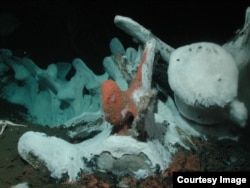Valued for their meat and oil, whales were once considered of little consequence to the ocean.
But a new study suggests great whales -- Baleen, Sperm, Humpback, Blue and Gray -- have a powerful and positive impact on how the ocean works.
“They can increase nutrients in areas where they are feeding," said University of Vermont conservation biologist Joe Roman, lead author of the study. "So whales dive deep to feed. They come to the surface and, as it turns out, they defecate or they release whale poop at the surface. That has lots of nitrogen and other nutrients so it can increase productivity in areas where whales are feeding. ”
Whales continue to service the ocean even when they die and sink to the deep sea.
“That also brings nutrients down there and lots of habitats for species that depend entirely on those whale falls,” Roman said.
After centuries of decline, great whales are steadily repopulating their historic breeding and feeding grounds. And they have a healthy appetite. Some commercial fisheries argue the whales are eating too many other fish and taking a big bite from their profits.
But experts argue opposite is true.
“I think the classic view was ‘too many whales, not enough fish,’" Roman said. "But our study and several others are starting to show that it is far more complicated, more interesting than that, that is when whales are in a healthy ecosystem, we can have more fish and more whales at the same time.”
Roman argues whales are being blamed for poor fishery management.
“If we can restore our waterways, if we can better manage our fisheries, we are going to find that we will have more whales for us to enjoy as well as more fish for commercial fisheries, for recreational fisheries,” he said.
But even as whales rebound, they are not immune to human threats in the ocean. They are run over by container ships, caught in fishing nets, and disturbed by noise from ocean traffic and sonar signals.
“Shipping is increasing in the Arctic, plans for offshore oil and gas are increasing," said Margaret Williams, who directs the World Wildlife Fund's Arctic program. "And so World Wildlife Fund is working with government and communities and industry and other conservation groups to identify those areas that are very, very important for whale species, for migration areas, for feeding areas, and we’re recommending those areas receive special management attention.”
Williams says whales deserve this protection. They are, as the study underscores, more valuable than whalers ever imagined -- to us, to fisheries and to the ocean itself.






